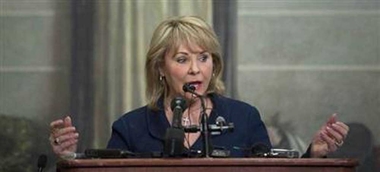Fallin: Election landscape creeps into support for taxes

OKLAHOMA CITY (AP) — Oklahoma Gov. Mary Fallin says many of her ideas for shoring up a $1.3 billion budget hole remain in play this session, but that some Republican legislators are hesitant to embrace major proposals like a tax hike or bond issue until they know what kind of opposition they face in an election year.
The filing period for candidates seeking office was moved from June to April a few years ago. As a result, legislators will know before the session is over whether they'll have a primary or general election opponent. If unopposed, the lawmaker might be more willing to make a politically tough vote to raise taxes or eliminate a popular tax exemption.
"I think there are some members who are waiting to see if they draw an opponent during filing in April," Fallin said when asked about ongoing negotiations with the House and Senate on the budget. "They're slow playing things."
All 101 House seats and half of the 48 Senate seats are up for election in the fall.
Fallin says several of her budget proposals for the upcoming fiscal year still are being discussed, including a tax increase on cigarettes and expanding the sales tax to some services that are currently exempt. The governor, who is midway through her final term, also proposed another $250 million in savings by redirecting revenue generated by state agencies through fees, fines and other sources.
The budget negotiations are taking place behind closed doors, and few concrete proposals have emerged. Other ideas being discussed are eliminating tax incentives and exemptions and approving a transportation bond issue to free up revenue to ease budget cuts. But the House and Senate have not reached agreement on any of those ideas, Senate President Pro Tem Brian Bingman said after the Legislature adjourned last week near its midway point.
"Honestly I can't tell you anything right now that I actually know that we can agree upon for increasing revenues, beyond what we have in the bank today and whatever the certification number is," said Bingman, R-Sapulpa. "At this point, everything is still in play."
Without generating additional revenue, state agencies could face cuts next year of 15 percent or more, a devastating financial blow to prisons and schools across the state, as well as services provided to the poor, disabled and elderly, all of which have been cut or held flat in recent years.
House Democratic Leader Scott Inman, who controls about 30 votes in the 101-member House, said his members aren't eager to support sales taxes that unfairly target working class Oklahomans, especially when Republicans just spearheaded reductions in taxes on income and oil and gas production that benefit the wealthy.
"Our caucus has said all along the reason we're in this mess is not because we don't tax senior citizens going to doctor's visits or people who are getting a haircut," Inman said, referring to services that currently aren't taxed in Oklahoma. "We're here because we cut $1 billion worth of income taxes, $2 billion worth of tax credits and exemptions, and the lowest gross production tax in the region."
By Sean Murphy. Copyright 2016 The Associated Press
The Gayly- 3/26/2016 @ 12:44 PM CST





